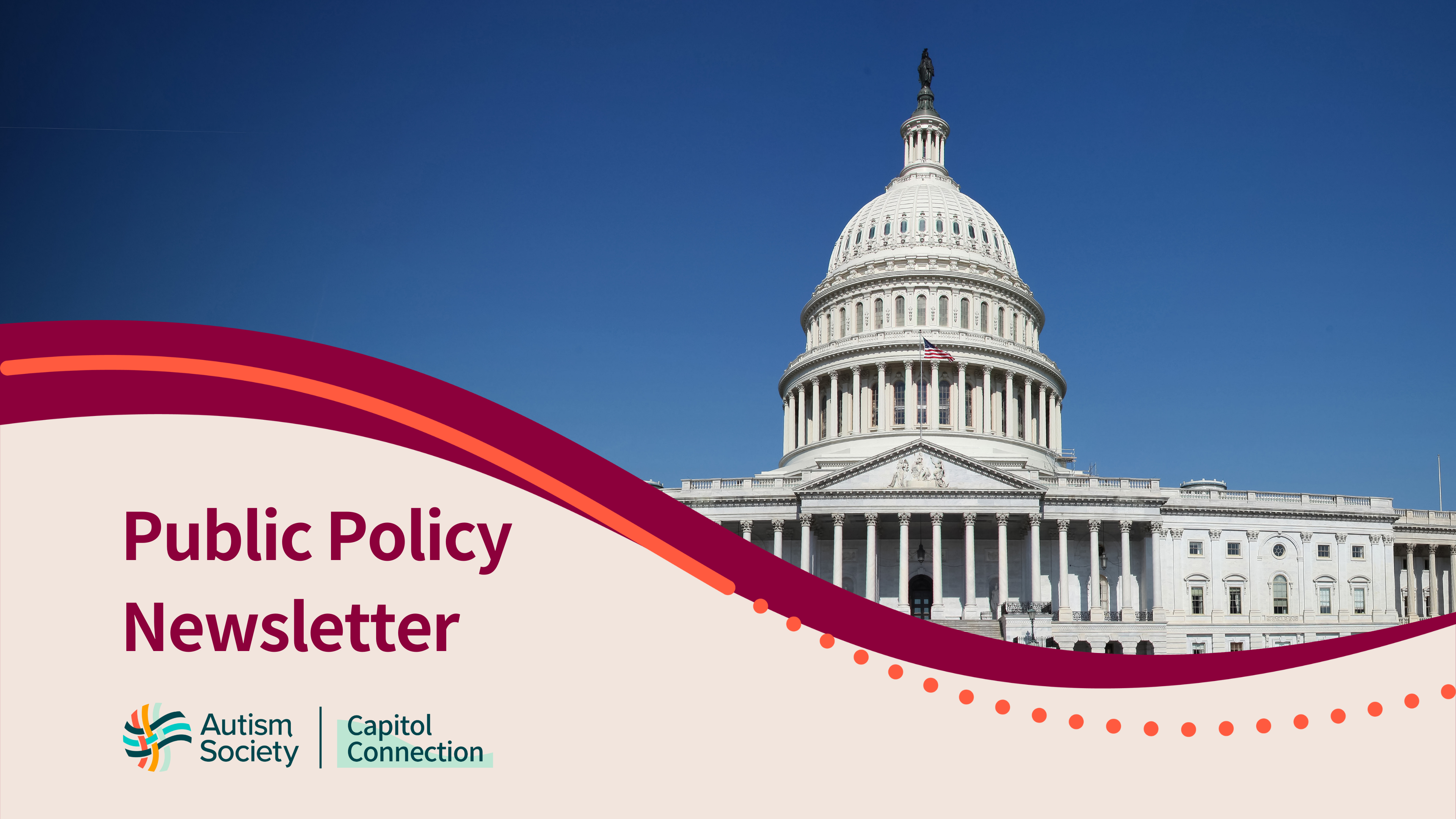
In this issue of Capitol Connection, find new resources to use to advocate at the state level on employment and education issues, links to hearings and markups on the Hill, and new guidance materials from the Department of Education. This is a good time to meet with legislators while they are working in the state. Please use the Autism Society’s online Action Center for ideas on issues and talking points.
Congressional Calendar
While most Members of the House and Senate are back in their states/districts for the Memorial Day recess, the House Judiciary Committee is holding a rare recess markup of a gun-control bill (H.R.7910, the “Protecting Our Kids Act,”) in light of two recent mass shootings.
Education
Teacher Shortages
On May 25, the House Appropriations Subcommittee on Labor, Health and Human Services, Education, and Related Agencies held a hearing on “Tackling Teacher Shortages.” Witnesses included Dr. Lindsey Burke, Director of the Center for Education Policy, Heritage Foundation; Desiree Carver-Thomas, Researcher and Policy Analyst, Learning Policy Institute; Randi Weingarten, President, American Federation of Teachers; and Dr. Jane West, consultant and former member of the CCD Education Task Force. Witnesses discussed issues facing teachers and their retention in the workforce, including limits to their pension, high student loan debt, and few resources for growing class sizes. These shortages especially affect public schools in urban areas and special education programs in public schools. Several witnesses voiced their support for creating a more diverse workforce of educators to benefit the growing population of students of color. Dr. Burke also encouraged legislators to look at the teacher shortages both with and without the context of the pandemic, as many of these issues were prevalent before the pandemic. Watch the archived recording on the committee website.
IDEA Full Funding
Congress is currently considering funding for the Fiscal Year 2023. As mentioned in a previous issue of Capitol Connection, the Administration’s budget request contains significant increases for special education and the Individuals with Disabilities Education Act, providing a glide path to fully fund IDEA. IDEA authorizes the federal government to provide 40 percent of the excess costs of educating students with disabilities; however, in 2022, only 13 percent of the excess costs were covered, creating an estimated shortfall of more than $23 billion dollars. A significant increase in Federal funding for IDEA would ensure that funding is available for programs that can benefit all students, including students with autism. The Autism Society is meeting with Members of Congress urging them to support the IDEA Full Funding Act. Please help us by using this action alert to write letters to your policymakers. Add personal stories about how funding will help you or your family members.
Mental Health Matters and RISE Act
On May 18, 2022, the House Education and Labor Committee held a mark-up of several bills including the Mental Health Matters Act. This bill, introduced by Rep. DeSaulnier (D-CA) would support the behavioral needs of students and youth, invest in the school-based behavioral health workforce, and ensure access to mental health and substance use disorder benefits. Title V of the bill includes the Respond Innovate, Succeed and Empower Act (RISE) Act. This bill, supported by the Autism Society, allows students with disabilities to present an IEP or 504 plan as proof of a disability when requesting accommodations in college. The bill was adopted by the committee 26-18. The next step is a full floor vote.
Financial Security
On May 24, the House Financial Services Subcommittee on Diversity and Inclusion held a hearing titled “Diversity Includes Disability: Exploring Inequities in Financial Services for Persons with Disabilities, Including Those Newly Disabled Due to Long-Term COVID”. The hearing. Among those testifying was Allie Cannington, Consortium for Constituents with Disabilities co-chair of the Housing Task Force. Employment, entrepreneurship, SSI asset limits, savings, and other financial security issues were explored. The archived hearing can be viewed on the Subcommittee website.
The Consortium for Constituents with Disabilities (CCD) Financial Security, Poverty, and Social Security Task Forces sent a letter to the Ways and Means Committee leaders urging them to include the ABLE Age Adjustment Act (S. 331/H.R. 1219) and the SSI Savings Penalty Elimination Act (S. 4102) in the final SECURE 2.0 legislation.
Department of Education Compliance
The U.S. Department of Education’s Office for Civil Rights (OCR) announced a compliance review of the Horry County Schools in South Carolina. The investigation identified concerns that students who were repeatedly subjected to restraint or seclusion lost educational time and services, and that the district did not re-evaluate students who were repeatedly restrained or secluded to determine whether they should receive additional support or compensatory services. The district agreed to change its practices with respect to the use of restraint or seclusion. The letter is available here and the resolution agreement is available here.
Digital Accessibility in Education
In addition, the Department of Education reported that its Office for Civil Rights will “soon launch” 100 compliance reviews focused on digital accessibility. The reviews will target K-12 schools and districts, postsecondary institutions, state departments of education, libraries, and vocational rehabilitation services, the agency said. Officials indicated that they will be looking at whether everything from online learning to school websites and platforms used to communicate with parents or provide them resources are in compliance with Section 504 of the Rehabilitation Act and Title II of the Americans with Disabilities Act.
The U.S. Department of Education’s Office for Civil Rights (OCR) released a 20-part video series covering a variety of topics on digital access in education, including how people with disabilities use technology, applicable federal regulations, and identifying and remediating barriers to access. The videos are designed for a wide range of audiences, including school webmasters, parents and students with disabilities, educational app developers, and other IT vendors. The videos are available on ADA National Network’s OCR Video Series page. For questions, contact the Office of Civil Rights at OCR@ed.gov.
Updated CDC Guidance for Schools
On May 31, CDC released updated guidance for K-12 and early care and education (ECE) programs. CDC’s update brings this guidance in-line with recommendations found in the COVID-19 Community Levels and provides a pathway for schools and ECE programs to prepare for summer programming and the upcoming school year. The updated guidance includes recommendations for prevention strategies for everyday operations, as well as strategies to add based on the COVID-19 Community Level (low, medium, or high.
State Advocacy
Employment SC
South Carolina has become the 12th state to phase out the use of subminimum wages that are only used for people with disabilities. According to Bloomberg News, Gov. Henry McMaster signed a bill (S. 533) barring employers from participating in the federal 14(c) waiver program. The law goes into effect on Aug. 1, 2024. It also establishes a task force to help people transition into competitive integrated employment.
Education Campaign in PA
Pennsylvania advocates are urging lawmakers to amend an existing law offering an extra year of schooling to those with developmental disabilities who turned 21 this school year or who will turn 21 during the next school year. Advocates also say that federal pandemic relief funding can cover the entire cost. Find out more about the Campaign to Fix Act 66. See the campaign flyer for more details.
COVID Funds for Schools
The federal government has invested nearly $190 billion to help K-12 education through the COVID-19 pandemic. This historic short-term funding gives states and school districts an opportunity to better support students with disabilities now and beyond. Melissa Junge and Sheara Krvaric, co-founders of the Federal Education Group, PLLC, will discuss COVID-relief spending options for special education with an eye toward sustainability and better coordination among traditional federal funding sources like IDEA and ESEA. Wendy Tucker, Senior Director of Policy for the Center for Learner Equity will then share creative ways to use these funds to support students with disabilities, incorporating recent federal guidance on educating students with disabilities in the wake of the pandemic. Learn more and register here.
Olmstead Anniversary
June 22, 2022, marks the date of the US Supreme Court Olmstead v. L.C. decision, a landmark case that held that unjustified segregation of persons with disabilities constitutes discrimination in violation of Title II of the Americans with Disabilities Act. On June 24th, the Toledo Museum of Art will be partnering with the Disability EmpowHer Network and the Ohio Olmstead Task Force for an event entitled, Disabled Women Make History (and Art): A Celebration of the 23rd Anniversary of The Olmstead Decision. The event is free but preregistration is encouraged.
.
Share:






